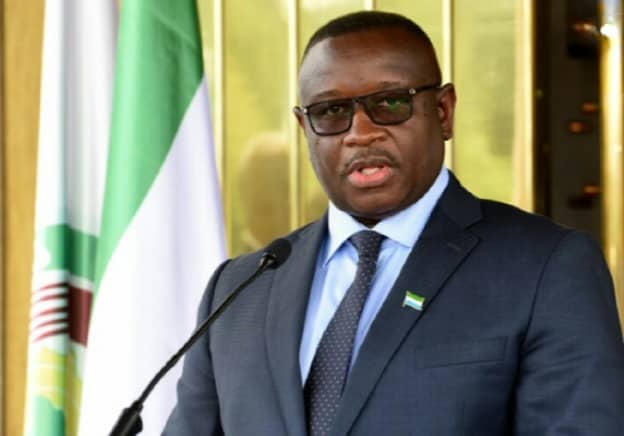By Julius Maada Bio
On August 12, 2024, during Sierra Leone’s presidency of the United Nations Security Council, I will preside over an unprecedented debate in the Council on “Maintenance of International Peace and Security: Addressing the historical injustice and enhancing Africa’s effective representation in the UN Security Council”. By rectifying the historical injustice, the international community will not only promote greater fairness and equality in global governance but also unlock the full potential of Africa as a dynamic and vibrant continent capable of contributing meaningfully to the advancement of peace, security, and prosperity worldwide.
In a world beset by myriad challenges from violent conflicts and environmental crises like climate change to global health emergencies and economic disparities, the necessity for a fair and effective global governance system has never been more apparent. At the core of this imperative lies the reform of the United Nations, especially its Security Council, tasked with upholding international peace and security. Despite the significant geopolitical transformations over the years, the Security Council remains shackled by an antiquated structure that perpetuates historical injustices, in particular against Africa.
The historical injustice against the African continent pertains to the unequal treatment and marginalisation of Africa within the structures of global governance, particularly the UN Security Council. Since its establishment after World War II, the Security Council’s composition has remained largely unchanged, with permanent seats held exclusively by the “victors of that war” – the United States, the United Kingdom, the Russia Federation, China, and France. In stark contrast, Africa, home to a significant portion of the world’s nations and the second most populous continent, lacks permanent representation in the Security Council.
This historical injustice stems from enduring colonial legacies and persistent power imbalances. The shadow of slavery intertwines with other legacies of injustice, including colonialism, imperialism, and exploitation. Africa has long been marginalised in global decision-making processes with its voice often drowned out, leading to inadequate representation on critical issues affecting the continent, such as conflict prevention, peacekeeping operations, conflict resolution, and sustainable development. This systemic bias perpetuates a cycle of marginalization, portraying Africa as a passive player in shaping global affairs.
Under the leadership of the African Union Committee of Ten Heads of State and Government on the reform of the UN Security Council (C-10), Africa has been steadfast in its commitment to rectifying this injustice and imbalance of the UN Security Council. As the Coordinator of the C-10, I have spearheaded efforts to amplify Africa’s voice on this issue. Through the Common African Position as espoused in the Ezulwini Consensus and the Sirte Declaration, Africa has articulated a clear and compelling vision for reform, one that ensures its equitable representation and meaningful participation in the Council’s proceedings.
Africa demands two seats in the permanent membership of the UN Security Council and an additional two seats in the non-permanent category, bringing the total of non-permanent seats to five. The African permanent members will be chosen by the African Union. On the veto, Africa wants it to be abolished. However, if UN Member States wish to retain the veto, it must be extended to all new permanent members.
The strides made in the UN General Assembly Inter-governmental Negotiations and the broad support garnered for the Common African Position signify a positive momentum acknowledged by Africa. The ongoing engagement spearheaded by Africa through the C-10 underscores the continent’s unyielding resolve for prompt reform. After two decades of negotiations in the current format, the time to address Africa’s distinctive plight is now. As the UN General Assembly deliberates on reform, it is vital for UN Member States to heed Africa’s call for justice and equity, urgently rectifying the historical injustice that has marginalized the continent for nearly eighty (80) years.
At the heart of Africa’s pursuit for reform lies the principle of equality among nations. It is unconscionable that in the 21st century, the Security Council continues to operate under a structure that privileges a select few at the expense of the many. Africa demands a recognition of its inherent worth and contribution to the global community. By advocating for a more inclusive and representative Security Council, Africa seeks to ensure that decisions affecting international peace and security are made with the input and perspectives of all nations, not just a privileged minority.
Furthermore, Africa’s demand for reform is rooted in the imperative of addressing the continent’s unique challenges and aspirations. African issues require African leadership and solutions. From enduring to emerging conflicts, terrorism, manmade famine, and humanitarian crisis, Africa grapples with a myriad of complex issues that require global cooperation and solidarity. This must be achieved with African leadership. By prioritising Africa’s concerns within the framework of UN Security Council reform, the UN can demonstrate its commitment to tackling the root causes of conflict and instability on the continent, thereby advancing the cause of peace and prosperity for all.
As the UN convenes in September 2024 for the Summit of the Future to chart a course for the coming decades, it must heed Africa’s call for reform and acknowledge the continent as a unique case deserving a special and urgent attention. The era of incremental measures and half-hearted progress must give way to decisive action. Africa’s voice must be heard, and its demands for justice and equity must be met.
By rectifying the historical injustices that have plagued the continent, the international community has a momentous opportunity to forge a more equitable and inclusive world order, one that upholds the dignity and aspirations of all nations, irrespective of their size or stature.
Now is the time for resolute action. Africa cannot afford to wait any longer.
*Dr. Bio is President of the Republic of Sierra Leone.
